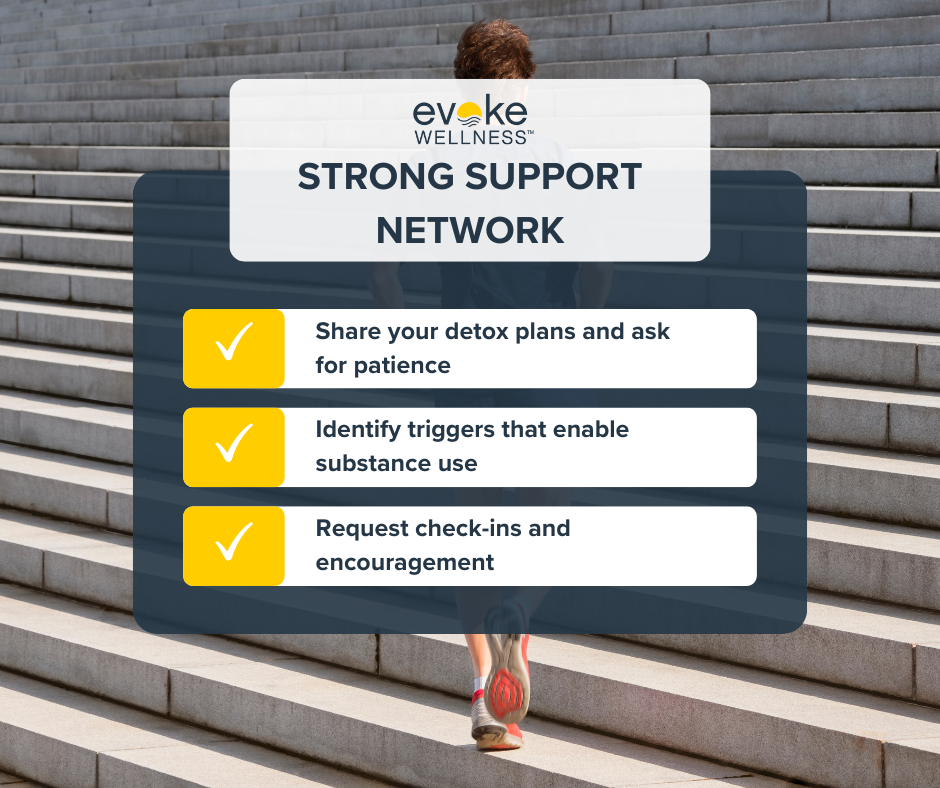Preparing for medical detox is a critical step in your journey towards recovery from substance abuse. As you consider entering a detox program, it’s essential to understand the process and take proactive steps to ensure a safe and effective experience. According to the Substance Abuse and Mental Health Services Administration, over 4 million Americans received substance abuse treatment in 2020. By preparing for acute detox, you can maximize the benefits of your chosen substance abuse treatment program and set the stage for long-term success. This article will guide you through the necessary steps to take before entering a detox program, including medical evaluations, arranging support systems, and exploring therapy options to complement your recovery journey.
Together, let’s embrace the journey to recovery and the promise of a new beginning. Call us at (833) 949-1347 today or reach out online.
Understanding Medical Detox
What is Medical Detox?
Medical detox is a crucial first step in the recovery process for individuals struggling with substance abuse disorders. It involves the safe and supervised removal of addictive substances from the body under the care of medical professionals. According to Stanford’s Human-Centered AI group, seeking professional detox care significantly improves outcomes compared to attempting to quit alone.
During detox, trained staff closely monitor vital signs and provide medications to alleviate uncomfortable withdrawal symptoms. This process helps stabilize the patient’s physical and mental state, preparing them for the next phase of addiction treatment.
Benefits of Professional Detox
Attempting to detox at home can be extremely dangerous, especially for those with severe addictions. Evoke Wellness emphasizes the importance of seeking professional help, as attempting to detox alone can lead to life-threatening complications.
- Safe, medically-supervised environment
- Management of withdrawal symptoms with medications
- Constant monitoring by experienced staff
- Lower risk of relapse during detox
Comprehensive Care Approach
At facilities like Evoke Wellness, medical detox is just the first step in a comprehensive treatment program. After stabilization, patients transition to therapy and counseling to address the psychological aspects of addiction.
Therapies may include cognitive-behavioral therapy (CBT), group support, and holistic activities like yoga and meditation. This multifaceted approach aims to equip individuals with the tools and coping mechanisms needed for lasting recovery.
Preparing for Detox Mentally
Understand the Emotional Impact
Entering detox involves more than just the physical process of ridding the body of substances. The psychological toll can be immense, as individuals grapple with intense cravings, mood swings, anxiety, and depression. According to Stanford’s Human-Centered AI group, addiction impacts neural pathways, altering brain chemistry and emotional regulation.
Embrace Therapeutic Support
Comprehensive addiction treatment programs integrate evidence-based therapies like Cognitive Behavioral Therapy (CBT) and Dialectical Behavior Therapy (DBT) to equip individuals with healthy coping mechanisms. As highlighted by Evoke Wellness, DBT teaches emotional regulation skills crucial for managing cravings and triggers during detox and withdrawal.
Address Underlying Trauma
For many struggling with substance abuse, unresolved trauma fuels the cycle of addiction. EMDR therapy facilitates the brain’s natural healing process, enabling individuals to process traumatic memories adaptively. By addressing the root causes, individuals can develop healthier coping strategies and reduce relapse risks.
Plan for Ongoing Support
While detox is the first step, long-term recovery requires a comprehensive continuum of care. Reputable rehab centers in Ohio offer tailored plans that combine clinical interventions with peer support, life skills training, and holistic wellness practices. Preparing an aftercare plan ensures sustained progress beyond detox.
How to Physically Prepare for Detox
Pre-Detox Planning
Take inventory of your physical health by consulting your doctor for a comprehensive medical evaluation. Disclose all substances used and any existing medical conditions, as this information guides the detox process. Your doctor may recommend specific pre-detox steps, such as gradually tapering substance use or starting certain medications to ease withdrawal symptoms.
Nutrition & Hydration
Proper nutrition and hydration are crucial for supporting your body during detox. Drugs and alcohol deplete vital nutrients, so focus on consuming a balanced diet rich in vitamins, minerals, lean proteins, and complex carbohydrates. Stay well-hydrated by drinking plenty of water and electrolyte-rich beverages to counteract potential dehydration from withdrawal symptoms like vomiting and diarrhea.
Exercise & Rest
While strenuous exercise is not recommended during acute withdrawal, light physical activity like walking or gentle stretching can help relieve stress and promote better sleep. Adequate rest is vital as fatigue is a common withdrawal symptom. Prioritize getting 7-9 hours of quality sleep each night leading up to your detox admission.
Mental Preparation
In addition to the physical aspects, mentally preparing yourself is key. Inpatient treatment in a dedicated detox facility provides a safe, trigger-free environment to focus solely on your recovery. Utilize available therapy resources to build healthy coping strategies for managing cravings and withdrawal symptoms during this challenging transition.
Arranging Your Support System
Close Circle of Trust
Having a strong support network is crucial during medical detox. Surround yourself with close friends and family who understand your journey and can provide emotional support. Be open about your needs and set boundaries if necessary.

Professional Support
In addition to loved ones, having professional guidance is invaluable. Work closely with addiction counselors and therapists who specialize in substance abuse recovery. They provide coping strategies and relapse prevention plans tailored to your situation.
- Access 24/7 medical supervision during detox
- Participate in individual and group therapy
- Utilize community resources and alumni networks
Self-Care Practices
Don’t underestimate the power of self-care during this transition. Simple practices like meditation, journaling, and light exercise can improve your mindset. Explore new hobbies too – art, music, or nature outings are great outlets.
Preparing a multifaceted support system allows you to detox safely while nurturing your physical and mental health. With the right care team by your side, you’ll feel empowered throughout recovery.
Understanding and Managing Withdrawal Symptoms
Recognizing Withdrawal Effects
During detox, it is crucial to understand and prepare for the potential withdrawal symptoms that may arise. As the body eliminates addictive substances, it can trigger a range of physical and psychological effects. Common symptoms include intense cravings, anxiety, insomnia, muscle aches, nausea, vomiting, and chills. The severity and duration can vary based on the substance, the duration of use, and individual factors.
Withdrawal Timeline
The withdrawal timeline typically unfolds in several stages. Acute withdrawal often begins within 12-24 hours after the last dose and peaks around 3-4 days, with intense physical symptoms. Early withdrawal, lasting 2-4 weeks, involves less severe physical effects but strong psychological cravings and mood swings. Post-acute withdrawal syndrome (PAWS) can persist for weeks or months, characterized by emotional disturbances, memory issues, and difficulty managing stress.
Managing Symptoms Effectively
Attempting detox alone can be extremely dangerous and even life-threatening. Professional detox programs provide a safe, controlled environment with 24/7 medical monitoring and support. Medication-assisted treatments can help alleviate withdrawal symptoms and cravings, while evidence-based therapies like Dialectical Behavior Therapy (DBT) teach coping strategies, emotional regulation, and mindfulness techniques to manage discomfort and prevent relapse.
Comprehensive care that addresses both the physical and psychological aspects of withdrawal is crucial for a successful detox experience and a solid foundation for long-term recovery.
After Detox: Planning for Long-Term Recovery
Transition to Comprehensive Treatment
Completing detox marks an important milestone, but it’s just the first step in the recovery journey. According to Stanford, detox programs typically last 5-7 days and focus on safely managing withdrawal symptoms. To achieve lasting sobriety, transitioning into a comprehensive addiction treatment program is crucial.
This may involve inpatient (residential) rehab, intensive outpatient treatment, or a combination of therapies tailored to individual needs. These programs address the root causes of substance abuse through counseling, behavioral therapies, life skills development, and building a strong sober support network.
Ongoing Recovery Support
Even after completing a treatment program, the road to recovery is a lifelong process. Evoke Wellness Ohio’s aftercare program provides structured support to help patients maintain sobriety as they readjust to daily life. This includes creating a customized plan outlining ongoing activities like counseling, support group meetings, and relapse prevention strategies.
Additional resources like sober living homes, alumni programs, and community support groups can reinforce the skills learned in treatment and provide accountability. As highlighted, ongoing aftercare planning is crucial for preventing relapse and achieving long-term recovery.
Addressing Underlying Issues
For many individuals, substance abuse is a coping mechanism for underlying mental health conditions, trauma, or environmental stressors. Detox alone may not be sufficient in these cases, as unresolved issues increase the risk of relapse.
Comprehensive treatment programs like dual diagnosis treatment address co-occurring disorders simultaneously, while therapies like cognitive-behavioral therapy (CBT) and trauma-informed care help individuals develop healthier coping strategies. Building a strong support system through group therapy, family counseling, and aftercare planning is equally important for maintaining sobriety long-term.
Preparing for Detox: Frequently Asked Questions
What is medical detox?
Medical detox is the first crucial step in addiction recovery. It involves safely removing addictive substances from the body under 24/7 medical supervision. Attempting to detox alone can be extremely dangerous and even life-threatening. A professional detox program provides medication management, therapeutic support, and monitoring to ensure a safe, comfortable withdrawal process.
How long does detox take?
The duration of detox varies based on factors like the type of substance, length and severity of addiction, and the individual’s overall health. Generally, the acute withdrawal phase lasts 5-7 days for most substances. However, some individuals may experience post-acute withdrawal symptoms for weeks or months after. A comprehensive detox program provides stabilization and prepares the individual for further addiction treatment.
What happens after detox?
After completing medical detox, individuals typically transition directly into a residential treatment program. This provides a continuum of care in a safe, supportive environment. Inpatient rehab combines evidence-based therapies, counseling, holistic healing approaches, and relapse prevention strategies to address the root causes of addiction and build a strong foundation for long-term recovery.
How much does detox cost?
The cost of medical detox can vary significantly based on factors like location, program duration, amenities, and whether insurance coverage is available. Many leading rehab facilities like Evoke Wellness accept major insurance plans like CIGNA and Blue Cross Blue Shield to help make detox and addiction treatment more accessible and affordable for those in need.
Conclusion
As you prepare to enter a medical detox program, remember that this crucial step sets the foundation for your recovery journey. By following the steps outlined above – from gathering essential documents to arranging aftercare – you’ll be well-equipped to navigate the challenges of acute detox. Recent studies show that patients who adequately prepare for detox have a 28% higher completion rate. Your commitment to substance abuse treatment and therapy programs will be vital for long-term success. While the road ahead may seem daunting, know that with proper preparation and support, you’re taking a courageous step towards reclaiming your health and well-being. Embrace this opportunity for transformation, and trust in the process of healing that awaits you.
Begin Your Journey with Evoke Wellness at Hilliard
If you or a loved one is considering treatment, Evoke Wellness at Hilliard invites you to contact us. Our compassionate team is ready to answer your questions, discuss your needs, and help you take the first steps toward recovery. In Hilliard, you’ll find more than just a treatment program – you’ll discover a community dedicated to your wellness and success. Together, let’s embrace the journey to recovery and the promise of a new beginning. Call us at (833) 949-1347 today or reach out online.



